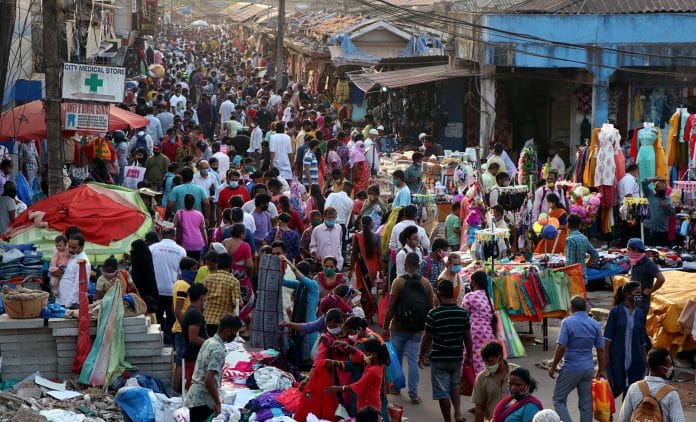
Thank you dear subscribers, we are overwhelmed with your response.
Your Turn is a unique section from ThePrint featuring points of view from its subscribers. If you are a subscriber, have a point of view, please send it to us. If not, do subscribe here: https://theprint.in/
Recently DMK leaders and IT wing started using a Tamil word (இந்திய ஒன்றிய அரசு – India Onriya Arasu) to refer to ‘Central Government’. BJP’s online warriors took notice of it and were offended promptly and a low-key twitter war ensued.
What DMK, the champion of states’ rights, intended to do with this coinage, is to emphasize the importance of states’ rights and powers in the wake of the all-consuming PM office. Historically, democratic governments are classified into two categories of governments: Unitary and Federal. A federal government, like the USA, should have a clear written constitution, well-defined portfolios of Federal and State governments, and a Supreme Court with powers to settle the disputes between them.
In a Unitary government, such as the Soviet Union or France, there is a powerful central government and states and local governments with negligible powers. A Federal government cannot dissolve a state government whereas a unitary government can do whatever it pleases to do. Thus, one can safely conclude that India is a Unitary government with federal features. In simpler terms, India is a federal-curious but strictly straight-up unitary government.
The Union of India or United States of India?
The Tamil word, Onriyam (ஒன்றியம்) loosely refers to the federal government instead of Central government. However, something is lost in the translation. In reality, the Tamil word ‘Onriyam’ does not refer to the federal government but a unitary government at large.
Thus DMK made a mistake by using Onriyam (ஒன்றியம்) to refer to a federal government. However, the question at hand is larger than DMK and its holy war for states’ rights. How do Indian states view themselves and the formation of India? In the USA, 13 states came together and formed a government in which a federal government with fewer powers and powerful states with specific and residuary powers.
Post Independence, British India of 14 provinces and 365 Princely States had been split into India and Pakistan. Sardar Vallabai Patel and Krishna Menon, drafted a deed of annexation namely ‘an instrument of accession’ and approached 365 princely states individually, and annexed them one by one. Hence we can say, historically India is born as a unitary government. A
After Independence, Indian statesmen felt that a strong center is a necessity to unite numerous cultures, languages, and customs. However, the abolishment of the Princely States and the formation of linguistic states changed the Indian polity forever. It is in this spirit, one should ask oneself if India should re-imagine and reinvent itself as a unitary style ‘Indian Union’ or federalist ‘United States of India’.
Abolishment of Governorships and Article 356
Today’s India’s linguistic states crave autonomy. Gone are the days when states fearing the mere uttering of Article 356. DMK’s Patriarch Annadurai’s slogan, ‘Why does a goat need a goatee and why does a state need a governor?’ still resonates with the people of Indian states.
Governors’ incessant breathing down on the necks of the CMs makes the state feel inferior and outrageous. When I discussed Article 356 in my ‘Constitution of India’ class, one of the students (2K kid!) bewildering asked ‘Can they dissolve an elected Assembly? Did it ever happen to Tamilnadu? Why didn’t we abolish it yet?’
Gen Z expects a lot from our statesmen at the least to stop ‘Helicopter Admistration’ by governors. We either have to abolish the Governor post or made the post directly elected by the states’ voters. Also, we should remove Article 356 because it is used as a political weapon. The central government can send troops using Article 355 as a contingency measure for any unforeseen circumstances without dissolving the state legislature.
States, not provinces
Linguistically divided Indian states should rightfully be recognized and treated as full-fledged States on their own, rather than merely treated as provinces. This will strengthen the Indian State as a genuine, mutually respectful, equal stakeholders’ confederation. Indian Constitution expressly refuses the states the right to succeed from the union, and we have a mighty army. Hence, there is no need to fear the consequences. Besides, succession movements are having no traction at all in Indian politics now.
Many want separate statehoods in India but no state wants to break from India. During elections, we hear the steady drumbeat of the invasion of the North(erners). The immigration of Hindi Speakers as workers, in the Rest of India, triggers the fear for the preservation of their language, culture, and politics. What better way to assuage their fear than recognizing the States as equals. All this needs a clear mind, a strong heart, and a true love for India. I am hopeful that our statesmen will rise to the occasion.
These pieces are being published as they have been received – they have not been edited/fact-checked by ThePrint.


COMMENTS